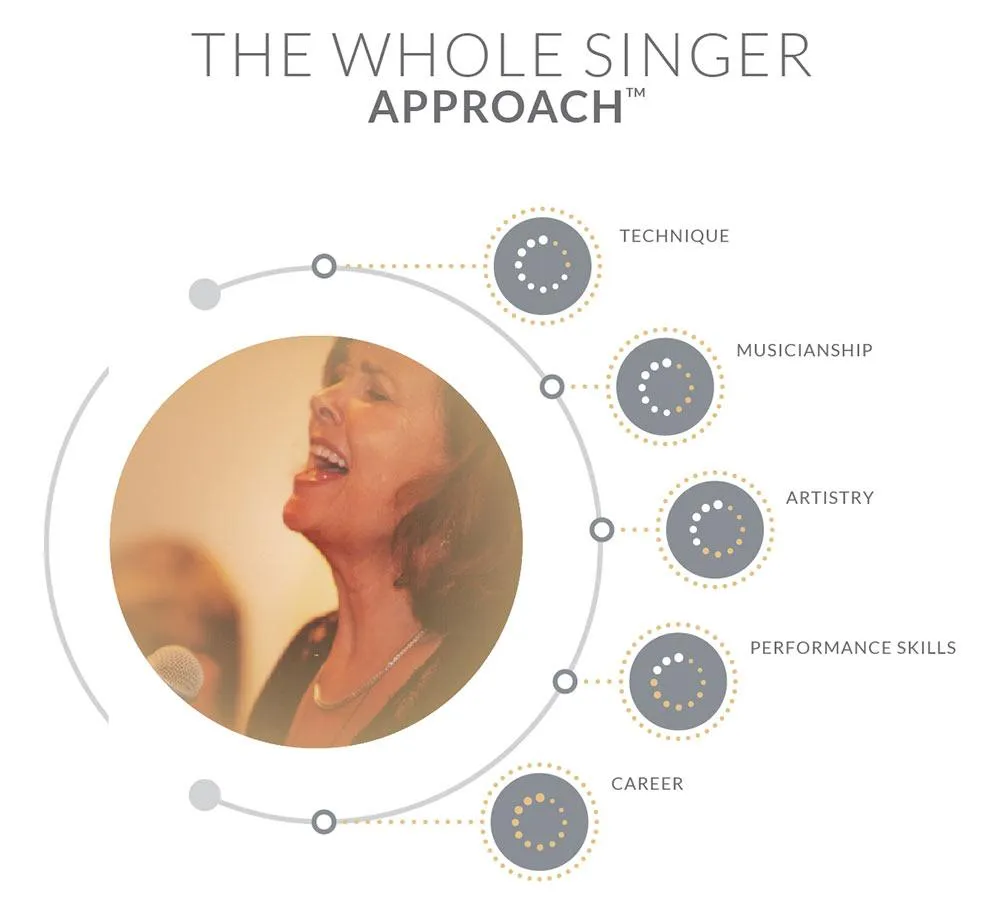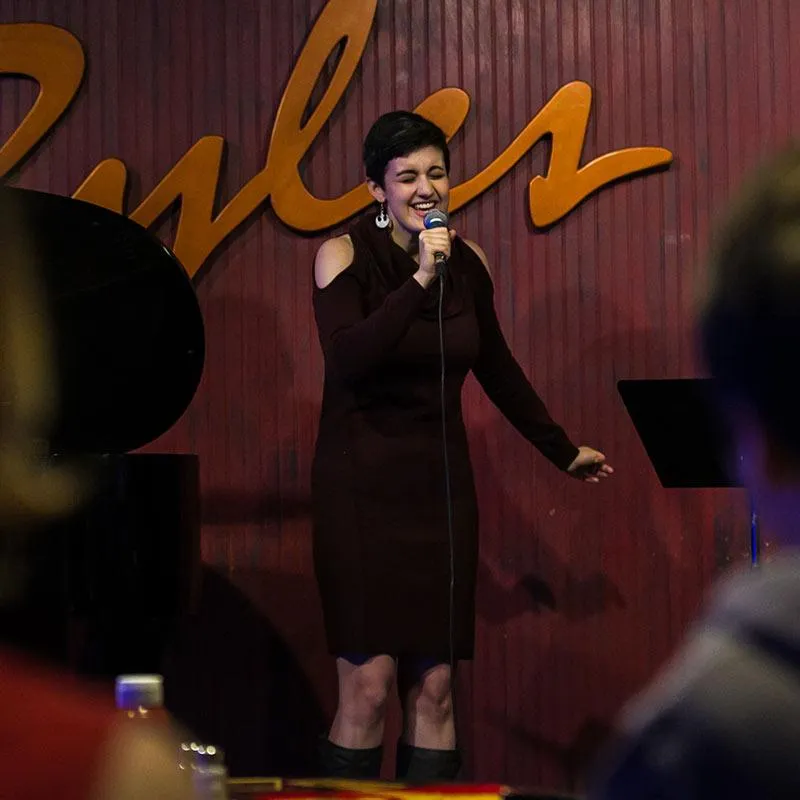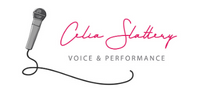The Whole Singer Approach™
At the Celia Slattery Voice Studio, we teach a functional approach to vocal technique – based on how the voice actually works – combining the best of traditional classical training along with the latest research in voice science and medicine.
It’s kind of like physical training for the voice.
You’ll receive vocal exercises (vocalises) tailor-made to your unique voice.
As you practice the vocalises and receive coaching, your voice will get stronger, healthier, more flexible.


Take Your Singing to the Next Level
Want to start gigging? Get cast in a show? Join an acapella group?
We understand Contemporary Commercial Music (CCM) styles and can help you reach your goals.
Past and current studio members include professional touring and recording artists, performing actor/singers, as well as students, speakers, and those recovering from vocal health issues.
About Celia
I’ve been singing and teaching for over thirty years. I wasn’t what you’d call a “natural” singer: I had some problems with my voice and I suffered from stage fright. So I kept studying with different teachers and learning as much as I could about Voice and Performance Skills as well as the music business.
I earned a Masters Degree at Lesley University that allowed me to combine my love for performing with Voice and Jazz studies at New England Conservatory.
Subsequently, I built a career that has given me broad experience in Contemporary Commercial Music (CCM): I have entertained at clubs and coffeehouses, recorded three albums, toured a one-woman show, and sang for six months in a famous hotel overseas. You can find out more about my background here and hear my music here.
I am certified in Somatic Voicework™ (the LoVetri Method) a state-of-the-art method of vocal technique.

Celia Slattery
Currently, I am an Associate Professor in the Voice Department at Berklee College of Music and have also taught at New England Conservatory Summer School, Salem State University and Lesley University.
I founded the Voice Studio in 2005 and since then it’s been my passions to help hundreds of students overcome some of the obstacles I experienced so that they too can reach their goals.
What Students are Saying
"Highly recommended for the serious student. The exercises and instruction have made a noticeable difference in vocal range and we could not be happier. Celia is great, and the studio also has excellent performance opportunities for those who take advantage of them."
Pauline Flanagan
Mother of Caela
"As a result of working with Celia and learning the Somatic method, I’ve been able to greatly increase my stamina and comfort level while singing all night."
Davina Yannetty
Entertainer
Learned how to Belt
Keely Dawn
FAQs
What is CCM?
CCM stands for “Contemporary Commercial Music,” ie: jazz, pop, rock, folk, musical theater, R&B.
It’s a relatively new term used in the vocal pedagogy community to replace the word “non-classical” – implying that our American popular styles are finally getting the respect they deserve!
Contrary to what some classical teachers may tell you, CCM singing is different than classical singing. It requires a different approach and an understanding of the stylistic parameters of each genre.
How do Voice Lessons actually work?
Voice Lessons can best be compared to physical training for the voice. Each student is given tailor-made exercises to address their unique voice, taking into consideration their current strengths and weaknesses as well their musical goals.
These exercises include posture and breathing exercises and vocalises – singing exercises which improve tone, extend range, increase strength, and smooth out breaks.
During each lesson we also work on repertoire of your choice. We approach it from a number of perspectives, including technique, style, and musicianship. Many students also use part of their lesson time to get career advice, performance coaching, or feedback on their songwriting.
What if I've had vocal health problems?
Any vocal health problems should be checked out by a laryngologist who works with singers. (Here in Boston, we have an excellent facility in the MGH Voice Center). If you have had surgery or speech therapy, and have been told you’re ready to take singing lessons, we can work with you to retrain your voice. We often receive referrals from clinics to do just that and have helped many students get back to singing again – better than ever! If, on the other hand, you have some troubling symptoms but have not had them checked out, we may refer you to a doctor in oder to make sure you’re ready for vocal training.
What results can I expect?
Our goals for every student are:
-- To be able to sing accurately, in tune.
-- To achieve at least two octaves of consistent tone (“mix”),
-- To build the stamina necessary for professional-level singing.
Students report that singing feels easier and that as a result, they feel more confident and better able to express themselves.
How long will it take?
How quickly you reach these goals depends upon many factors including:
-- Whether you have had any vocal health problems
-- What kind of training and experience (if any) you have had in the past
-- How much you practice
We always suggest that students make a minimum commitment of six months in order to see significant results. Some students see improvement much more quickly.
On the other hand, professional singers, like professional athletes, often have coaches throughout their careers. We’ve designed our programs and packages with flexible options for singers at every stage of their journey.
How much should I practice?
That depends on what your goals are and how much time you have. Some consistent practice – even ten minutes a day – is better than doing a big blow-out session every once in a while. (Just like training at the gym!) If you are singing professionally, or want to be, you need to aim for much more. See this article for more information about practicing.
Do I need to read music?
No! While it’s helpful to have some knowledge of music theory, many singers do not, and are able to learn entirely by ear.
If you want to learn more theory, that can be incorporated into your lessons, or we can recommend some outside resources.
Great! What's the next step?
Click here to set up your intro session, or contact us at [email protected].
During the session, you’ll have a chance to sing, describe your goals, and ask questions. We’ll give you an assessment of your voice and, if it’s a good fit, recommend a program or package of voice lessons. Once you’ve scheduled your first lesson you’ll become part of a supportive community to encourage you, and will have access to many resources to help you on your way to becoming a more confident and expressive singer!

FREE eBook!
Sign up now to receive
Five Steps to Singing Success

